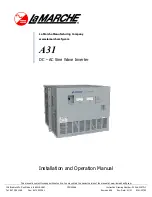
Software Overview
54
SLAA040
* clear mode related bits in CR0 and set MONO_INT:
@CR0_SEND &= #(MONO_INT^0FFFFh) ; clear bit for no calibration use
@CR0_SEND &= #(DUAL_INT^0FFFFh) ; clear bit for no calibration use
@CR0_SEND &= #(MONO_CONTINUOUS^0FFFFh); clear bit for no calibration use
@CR0_SEND &= #(DUAL_CONTINUOUS^0FFFFh); clear bit for no calibration use
@CR0_SEND |= #MONO_INT ; set calibration for further use
* clear clock related bits in CR0 and set internal clock mode:
@CR0_SEND &= #(CLK_INTERNAL^0FFFFh) ; clear bit for no calibration use
@CR0_SEND &= #(CLK_EXTERNAL^0FFFFh) ; clear bit for no calibration use
@CR0_SEND |= #CLK_INTERNAL ; set calibration for further use
* set mode for intermal offset calibration:
@CR_CALIBRA |= #INT_OFF_CALIB ; set internal calibration mode
*******************************
* verify ADC register CR0/CR1
*******************************
* write CR1 (to reset old CSTART mode initialization, because otherwise, the ADC never sets
* back its INT– pin to show a sample is available:
@CR_PROBLEM = #(SW_PWDN|NO_AUTO_PWDN|NO_2COMPLEMENT|NO_DEBUG|RES_10_BIT|RD_CONV_START);
port(ADC) = @CR_PROBLEM ; Address decoder sets CS low,
; WR– low and send CR_PROBLEM value to the ADC
NOP ; wait for tW(CSH)=50ns
* write CR1
* initialize the send values to setup the two programmable registers of the ADC
@CR_PROBLEM =
#(NO_SW_PWDN|NO_AUTO_PWDN|NO_2COMPLEMENT|NO_DEBUG|RES_10_BIT|CST_CONV_START);
port(ADC) = @CR_PROBLEM ; send CR0 value to the ADC
port(DEACTIVE) = @ZERO ; deselect ADC (CS high)
NOP ; wait for tW(CSH)=50ns
* write CR0
port(ADC) = @CR_CALIBRA ; send CR0 value to the ADC
port(DEACTIVE) = @ZERO ; deselect ADC (CS high)
NOP ; wait for tW(CSH)=50ns
********************************************
* do one sample to perform the calibration
********************************************
XF = 0 ; clear CSTART
repeat(#10)
nop ; wait for some sampling time
XF = 1 ; reset CSTART
repeat(#34)
Содержание TLV1562
Страница 6: ...vi SLAA040 ...
















































